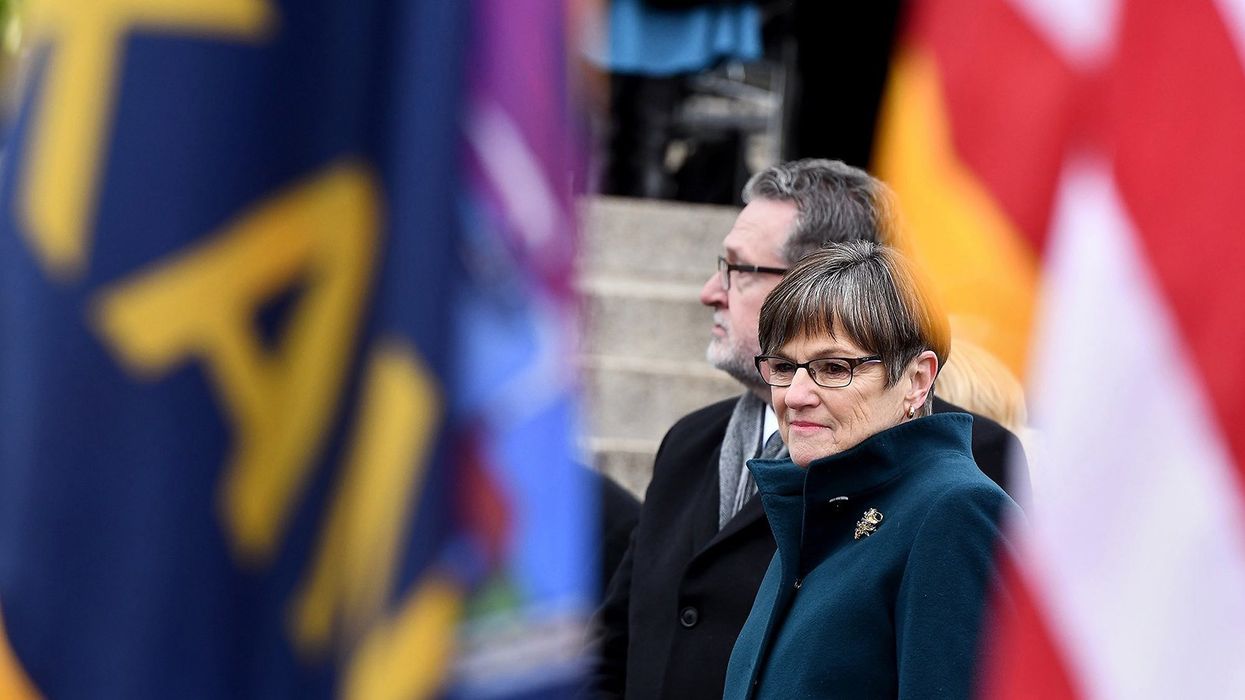
Kansas Democratic Gov. Laura Kelly (Jill Toyoshiba/Kansas City Star/Tribune News Service via Getty Images)

'Singled out'
Kansas Democratic Gov. Laura Kelly issued an executive order April 7 prohibiting mass gatherings of more than 10 people — and explicitly called out religious services. But a federal judge issued a ruling Saturday blocking the governor's order.
U.S. District Judge John Broomes said that he believes the policy likely violates religious freedom as well as free speech protections, the Associated Press reported.
Broomes' ruling prevents the enforcement of Kelly's order as long as church officials and members of the congregation following social distancing guidelines, the AP said.
The case was brought by two Baptist churches — First Baptist Church of Dodge City and Calvary Baptist Church of Junction City — that were represented by the Alliance Defending Freedom.
Kelly has issued a string of executive orders addressing "mass gatherings" amid the coronavirus pandemic, with each new order replacing the previous and becoming more restrictive — especially with regard to religious gatherings.
Broomes noted that on March 17, the governor issued an order prohibited "mass gatherings" of 50 or more people. But the order included a list of exemptions, including “Religious gatherings, as long as attendees can engage in appropriate social distancing."
A week later, on March 24, Kelly issued a new order banning gatherings of 10 or more people. The exemption for religious gatherings was maintained.
And on March 27, the governor actually declared performing or attending religious services as an "essential function."
Then, on April 7, just days before Easter, Kelly issued a new executive order with an updated list of venues where the "mass gathering" rule applies — and for the first time the list included "churches or other religious facilities."
But that wasn't all that was updated.
The new order included new language specifically targeting churches:
With regard to churches or other religious services or activities, this order prohibits gatherings of more than ten congregants or parishioner in the same building or confined or enclosed space. However, the number of individuals – such as preachers, lay readers, choir or musical performer, or liturgists – conducting or performing a religious service may exceed ten as long as those individuals follow appropriate safety protocols, including maintaining a six-foot distance between individuals and following other directive regarding social distancing, hygiene, and other efforts to slow the spread of COVID-19.
And the order had a long list of exemptions, many of which seemed to be as problematic as church services:
Broomes took a look at the governor's order that noted that, though the designation of religions gatherings as "essential functions" had not been changed, the governor had added restrictions on churches.
And then he wrote what was clear to any observer: The churches has been "singled out." He said (emphasis added):
The Governor previously designated the attendance of religious services as an “essential function" that was exempt from the general prohibition on mass gatherings. That designation has not been rescinded or modified, yet in EO 20-18 and EO 20-25 churches and religious activities appear to have been singled out among essential functions for stricter treatment. It appears to be the only essential function whose core purpose — association for the purpose of worship — had been basically eliminated.
The judge then listed a number of "secular facilities that are still exempt from the mass gathering prohibition" or "are given more lenient treatment, despite the apparent likelihood they will involve mass gatherings."
Broomes made the logical point that the churches were "targeted" because of "the nature of the activity involved." He wrote (emphasis added):
The legitimate health and safety concerns arising from people attending religious services inside a church would logically be present with respect to most if not all these other essential activities. Defendant has not argued that mass gatherings at churches pose unique health risks that do not arise in mass gatherings at airports, offices, and production facilities. Yet the exemption for religious activities has been eliminated while it remains for a multitude of activities that appear comparable in terms of health risks. Based on the record now before the court, the most reasonable inference from this disparate treatment is that the essential function of religious activity was targeted for stricter treatment due to the nature of the activity involved, rather than because such gatherings pose unique health risks that mass gatherings at commercial and other facilities do not, or because the risks at religious gatherings uniquely cannot be adequately mitigated with safety protocols.
It is also an arbitrary distinction, in the sense that the disparity has been imposed without any apparent explanation for the differing treatment of religious gatherings. These facts undermine Defendant's contentions and lead the court to conclude that EO 20-18 and EO 20-25 are not neutral laws of general applicability. Instead, they restrict religious practice while failing to “prohibit secular activity that endangers the same interests to a similar or greater degree."
The judge's ruling striking down the governor's order does not permit churches to have restriction-free services. He ordered the churches to follow social distancing guidelines and to continue practices that they had already put in place.
Kelly continued to defend her order, the AP said, quoting her: “This is not about religion. This is about a public health crisis."
The Alliance Defending Freedom celebrated the ruling. Senior counsel Tyson Langhofer said, "Public safety is important, but so is following the Constitution. We can prioritize the health of safety of ourselves and our neighbors without harming churches and people of faith," the AP reported.